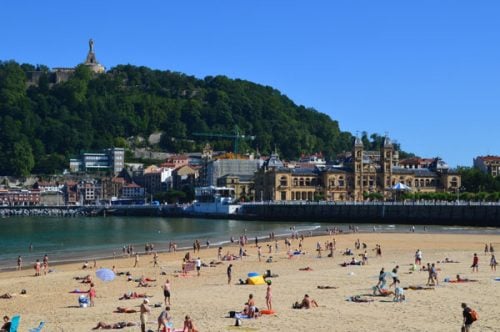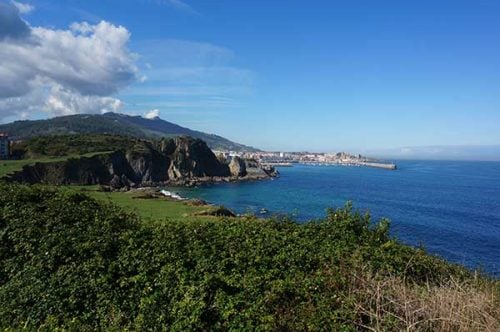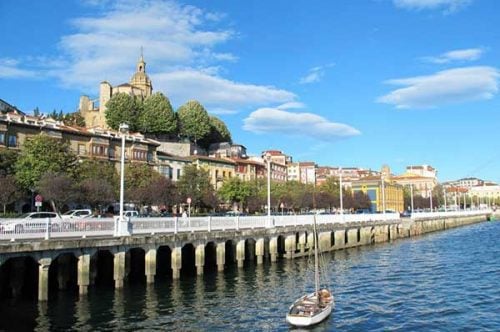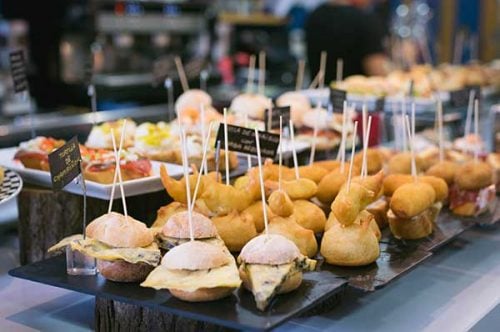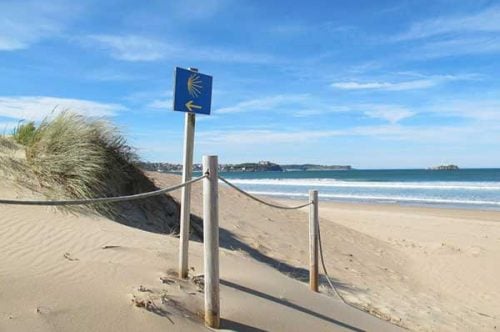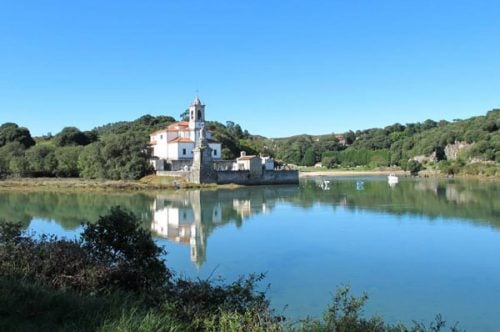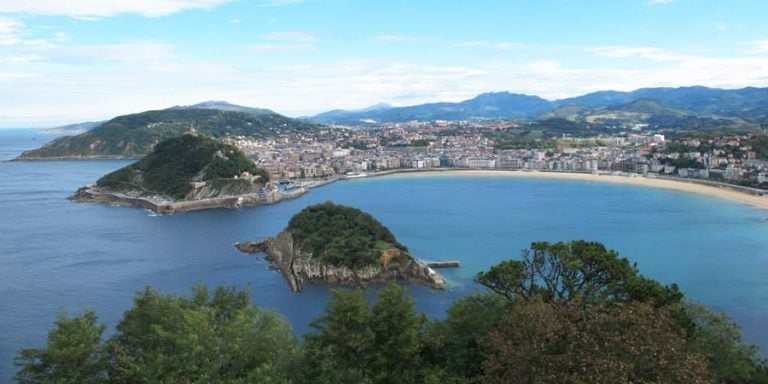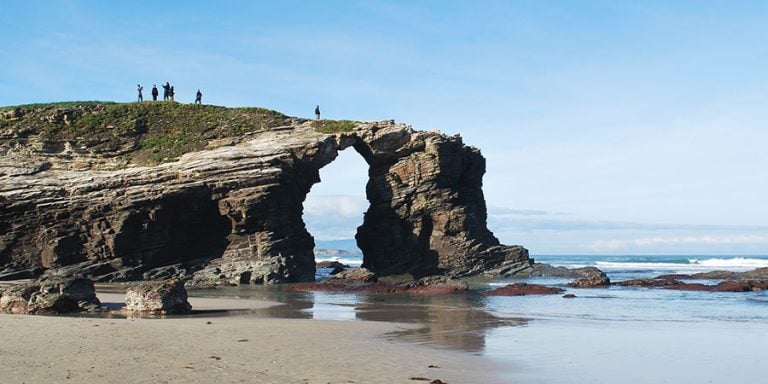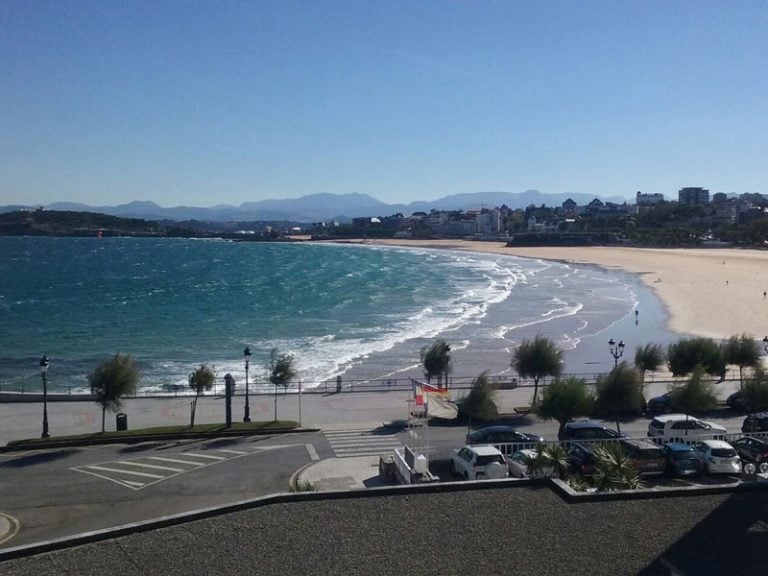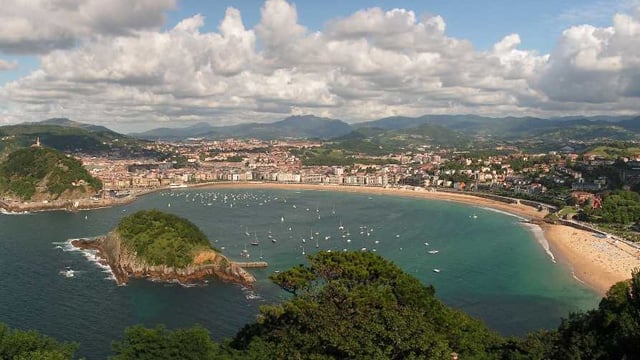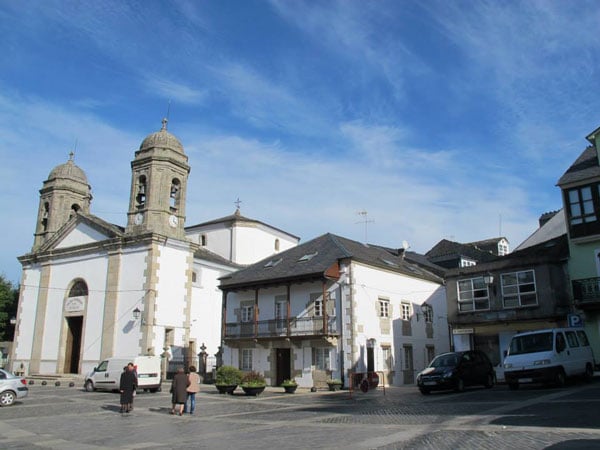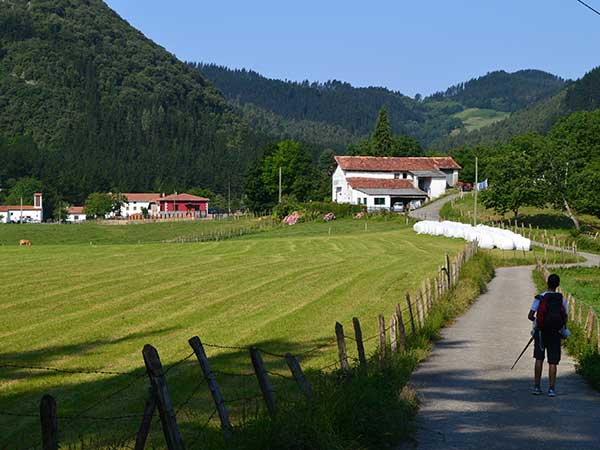The Camino del Norte
The Camino del Norte, or Northern Way, is one of the most breathtaking routes of the Camino de Santiago. Following Spain’s wild and beautiful “Green Coast” along the Bay of Biscay, this unforgettable path stretches from San Sebastián in the Basque Country to Santiago de Compostela in Galicia.
Known for its spectacular coastal scenery, vibrant culture, and world-class cuisine, the Camino del Norte offers pilgrims a unique blend of adventure and tranquillity. Starting in San Sebastián (or Donostia), a stylish seaside city renowned for its beaches and Michelin-starred restaurants, pilgrims embark on a journey through the heart of northern Spain’s coastal provinces — the Basque Country, Cantabria, Asturias, and Galicia.
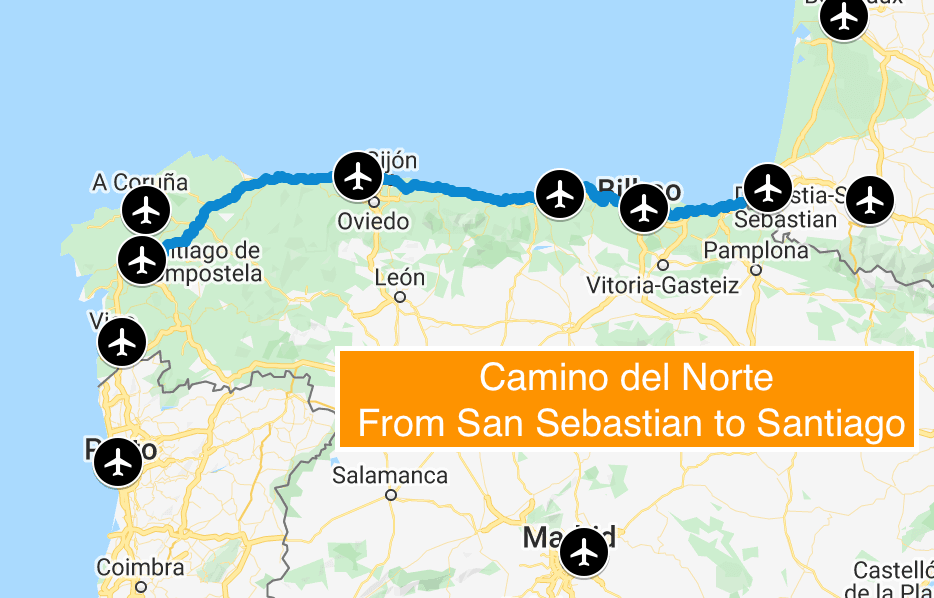
Along the way, highlights include the Guggenheim Museum in Bilbao, the royal palace in Santander, Asturias’ traditional cider houses, and Ribadeo’s breathtaking Cathedral Beach. You’ll wander through medieval gems like Mondoñedo and enjoy sweeping ocean views from green cliffs and quiet beaches. Each stage brings new flavours, from fresh seafood to hearty mountain dishes — a celebration of northern Spain’s diverse gastronomy.
Walking the full Camino del Norte from San Sebastián to Santiago takes around five weeks, but many pilgrims choose to walk shorter sections. The final 100km from Vilalba to Santiago is ideal for those who wish to earn their Compostela certificate while experiencing the charm and serenity of this coastal route.
For pilgrims seeking a less crowded, more contemplative Camino, the Northern Way is a perfect choice — a path where sea and mountains meet, and every step reveals the wild beauty of Spain’s northern shores.
Why Walk the Northern Way?
The Camino del Norte is perfect for pilgrims seeking a coastal journey away from the crowds of the Camino Francés. It offers a quieter but equally rewarding experience, with daily views of the sea, rugged hills, and forests.
This Camino is also deeply cultural: Basque Country, Cantabria, Asturias, and Galicia each have their own languages, traditions, and cuisines. From Basque pintxos and Bilbao’s Guggenheim Museum to Asturias cider and Galicia’s seafood, the Northern Way offers an immersion into four distinct regions of Spain.
Suggested Routes
Highlights of the Camino del Norte
- San Sebastián – elegant seaside city, famous for Michelin-star dining.
- Bilbao – home to the iconic Guggenheim Museum.
- Santander – golden beaches and royal palace.
- Asturias – cider houses, fishing harbours, and Picos de Europa views.
- Ribadeo – Cathedrals Beach, one of Galicia’s natural wonders.
- Vilalba to Santiago – the final 100 km through quiet Galician countryside.
What makes it special?
The Northern Way feels like a journey between sea and mountains. It blends coastal freshness with medieval history, where every stop — from fishing villages to royal palaces — adds character to your Camino. It’s also one of the best Caminos for food lovers.
Route Options and Stages
Walking the full 803 km takes about 5 weeks, but many choose shorter sections:
- San Sebastián to Bilbao – Basque gastronomy, Gernika, and Guggenheim Museum.
- Bilbao to Santander – coastal towns, rocky bays, and beaches.
- Santander to Ribadesella – Cantabrian coast and mountain scenery.
- Ribadesella to Oviedo – seaside villages, cider culture, and medieval Oviedo.
- Oviedo to Vilalba – quieter section through Asturias and Galicia.
- Vilalba to Santiago (Last 100 km) – required distance for Compostela.
👉 See more itineraries: Camino del Norte tours.
The Compostela Certificate
To earn the Compostela in Santiago:
- Walk at least 100 km (Vilalba–Santiago).
- Cycle at least 200 km (e.g. from Navia).
👉 Learn more: Compostela facts.
Terrain and Difficulty
- Nature of the trail: mixture of coastal paths, forest tracks, and quiet lanes.
- Elevation: daily ascents and descents (more challenging than the Francés).
- Overall: suitable for walkers with moderate fitness.
👉 Prepare with our Camino Fitness Plan.
When to Walk the Northern Way
- Spring & Autumn – best balance of mild weather and fewer crowds.
- Summer – cooler than inland Spain, rarely above 30°C.
- Winter – mild but wet, fewer pilgrims.
👉 See our guide: Best time to walk the Camino.
Camino Ways Route Planner
For over 1000 years, pilgrims from all over the world have walked the Camino Ways across Europe in their quest for spirituality. Making the pilgrimage to Santiago de Compostela in Spain, they encountered a variety of people, cultures and beliefs, leading to friendship and new experiences. This continues today with the Camino de Santiago being the most well known and well-loved walk in the world. More than just a walk, the Camino de Santiago is an unforgettable and unique journey for the body, mind and soul.
When to go on the Camino del Norte
The Northern Way has a mild climate, moderated by the Atlantic Ocean:
- Spring and autumn are the best times to travel, with an average of 20 degrees celsius.
- Unlike the hot summers of the centre and south of Spain, summer on this route rarely goes above 30 degrees celsius on average.
- Winters are mild but could be wet, and there are not many pilgrims on the routes during this period.
Compostela Certificate on the Camino del Norte
In order to get your Compostela pilgrim certificate in Santiago, remember you will need to walk a minimum of 100km into Santiago (we suggest you start your Camino in Vilalba) or cycle at least the last 200kms of the route (we suggest you start your Camino in Navia).
What To Bring On The Camino del Norte?
Our Camino packing guide ebook is free to download. This will help you decide what to bring on your Camino.
History of the Camino del Norte
The Northern Way is one of the oldest pilgrim routes, popular in the 9th and 10th centuries when the Camino Francés was less safe. Pilgrims arrived from across Europe — from Scandinavia, England, Flanders, and Germany — often by sea, landing in northern ports before walking to Santiago.
Pilgrims frequently visited Oviedo’s San Salvador Cathedral before continuing west. Eventually, the Francés route grew more dominant, but the Northern Way retained its cultural importance. Today, it is celebrated as both a historic and scenic alternative, joining the Camino Primitivo in Oviedo and the Camino Francés in Arzúa.
👉 Discover more: History of the Camino de Santiago.
Services That Make It Easy
When booking with CaminoWays, you’ll have:
- Handpicked hotels each night.
- Luggage transfers so you can walk freely.
- 24/7 support and maps provided.
👉 See Guided Tours.
👉 Or browse Self-Guided Tours.
FAQs
Q: What is the Camino del Norte?
A: The Camino del Norte, or Northern Way, is a Camino de Santiago route along Spain’s northern coast, from San Sebastián to Santiago de Compostela.
Q: How long is the Camino del Norte?
A: The full route is about 803 km and takes five weeks to walk. Many pilgrims choose the last 100 km from Vilalba to Santiago to earn their Compostela certificate.
Q: What are the highlights of the Camino del Norte?
A: Highlights include San Sebastián’s Michelin-star dining, Bilbao’s Guggenheim Museum, Santander’s beaches, Asturias cider houses, and Galicia’s Cathedral Beach.
Q: When is the best time to walk the Camino del Norte?
A: Spring and autumn are ideal, with mild temperatures around 20°C. Summer is cooler than inland Spain, while winters are mild but rainy. See our guide to the best time to walk the Camino.
Q: Can I cycle the Camino del Norte?
A: Yes, cycling is possible. To receive the Compostela, you must ride at least the last 200 km, for example, from Navia to Santiago. See cycling the Camino routes.
Q: What should I pack for the Camino del Norte?
A: Essentials include comfortable footwear, rain gear, and a daypack. Download our free Camino packing list to get prepared.
Q: Does the Camino del Norte connect to other Camino routes?
A: Yes, it links with the Camino Primitivo in Oviedo and joins the Camino Francés in Arzúa, before Santiago.
The Sections of the Camino del Norte
San Sebastian to Bilbao
The first section of the Camino del Norte (the Northern Way route of the St James Way) begins in the beautiful and sophisticated coastal city of San Sebastian, a gastronomic mecca home to several Michelin-star restaurants. From San Sebastian (or Donosti in Basque), the Northern Way travels west along the green hills of the Basque coastline. The trail passes the historic town of Gernika, made famous by Picasso’s masterpiece and finishes in Bilbao, where you should visit the impressive Guggenheim Museum. The Basque Country is renowned for its cuisine, its ‘pintxos’ and some of the country’s best chefs so this Camino walk will be an unforgettable gastronomic experience.
Bilbao to Santander
The Camino del norte from Bilbao to Santander, the Northern route of the Camino de Santiago, starts in the Basque city of Bilbao and finishes in the pretty coastal city of Santander, in Cantabria. Explore the old town in Bilbao and its magnificent Guggenheim Museum before you head west along the coast towards Santander. Along this section, you will walk by seaside towns, lovely beaches and rocky bays. This is an area of outstanding natural beauty and you will be able to admire the contrast between modernity and tradition, in the many towns and historic stops along the way. The north coast in Spain is renowned for its cuisine so prepare for an unforgettable gastronomic experience on the Camino.
Santander to Ribadesella
This Camino trip will see you travel along the third section of the Northern Way. This section of the Camino de Santiago will see you begin in Santander and finish in the pleasant seaside resort of Ribadesella. The mountains of the north provide a spectacular contrast to the charming and picturesque coastline. This region is renowned for its cuisine and the walk will see you enjoy a high level of comfort and an unforgettable gastronomic experience.
Ribadesella to Oviedo
The third section starts in the pretty seaside town of Ribadesella at the foot of the Picos de Europa, by the Cantabrian Sea. The trail takes pilgrims to the tranquil villages of rural Asturias where you can taste the delicious local food and famous cider, before finally arriving in the medieval city of Oviedo, the capital of the region. Asturias has excellent cuisine and is also famous for its cider. Oviedo marks the beginning of the Camino Primitivo, the original way to Santiago de Compostela, the most popular route until the 10th century.
Oviedo to Vilalba
This stretch along the coast is a true Gem. It is very quiet and there are not so many pilgrims visiting this section.
Villalba to Santiago
The last 100km of the Camino del Norte from Vilalba to Santiago de Compostela. This last stretch to Santiago de Compostela along the quiet lanes and dirt tracks into the heartland of Galicia.
Final Word
The Camino del Norte is a Camino of sea breezes, rolling green hills, and cultural treasures. From pintxos in San Sebastián to Galicia’s peaceful countryside, this coastal route offers one of the most beautiful and authentic ways to reach Santiago.
👉 If you’d like a personalised Camino del Norte itinerary, try our Award Winning Camino Planner.
